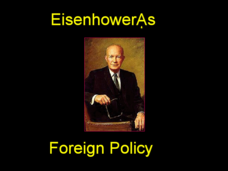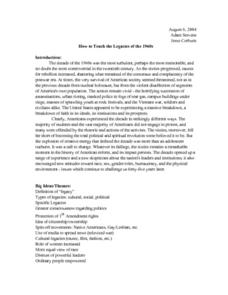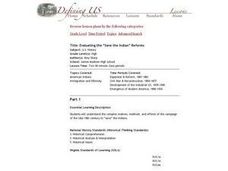Curated OER
The Homestead Act
Eighth graders analyze the Native American's viewpoint of the Homestead Act. Using one Native American group who lived in Nebraska, they write a letter to the editor of a local newspaper discussing the Homestead Act and how it affected...
Curated OER
Confict, Consensus, and Conclusion
Young scholars debate the key issues dealing with women's rights and the rights of African Americans during and after the Civil War. They analyze the women's rights movement in relationship to the desire for suffrage. They utilize the...
CHPCS
The United States in the 1920s: The New Negro Movement and the Harlem Renaissance
Music, writing, and activism all tell the story of history! The resource uses these elements and more in a presentation to discuss the Jazz Age and Harlem Renaissance. Your class views biographies, discusses important events, and...
Historical Thinking Matters
Rosa Parks: 5 Day Lesson
What led to the success of the Montgomery Bus Boycott, and how might historians approach this question differently? This rich series of lessons includes a short introductory video clip, analysis of six primary source documents, and...
PBS
The Sixties: Dylan Plugs in and Sells Out
Before Woodstock, there was Newport. Get plugged in to the social changes of the 1960s with a lesson plan that looks at Bob Dylan's performance at the 1965 Newport Folk Festival as a symbol of the radical changes that marked the era.
University of Arkansas
Promises Denied
"Promises Denied," the second instructional activity in a unit that asks learners to consider the responsibilities individuals have to uphold human rights, looks at documents that illustrate the difficulty the US has had trying to live...
Scholastic
The Rise of Railroads: California
Railways are an integral part of the history of California. Using a timeline format, class members connect major historical events to the rise of the railroads and their impact on the state. Activities include a mix of independent and...
Curated OER
Eisenhower's Foreign Policy
Good for setting the context for 20th century foreign policy issues, these slides describe key points in Latin America, the Middle East, the Far East, and Europe. US or World History classes will appreciate the concise list on each...
Core Knowledge Foundation
Volume 2 - A History of the United States: Modern Times—Late 1800s to the 2000s
The second volume of the Core Knowledge History of the United States ebook begins by asking young scholars to consider the impact immigration, industrialization, and urbanization had on the United States in the late 1800s. The text ends...
Curated OER
Tolerance in Times of Trial
Learners view the treatment of people of Japanese and German descent during World War II. They explore the problems in assigning blame to populations during times of war. They identify modern examples of discrimination and stereotyping.
Curated OER
Abraham Lincoln
In this biography worksheet, students read a one page factual story about Abraham Lincoln. Students then answer 7 questions about the story.
Curated OER
How to Teach the Legacies of the 1960s
High schoolers consider which aspects of world around them have roots in 1960s, research and compare 1960s to today with regards to Civil and Women's Rights, Vietnam, counterculture, music, voting, and economic rights, and explore legacy...
Curated OER
Pictures Telling Stories
Learners see the importance of primary sources in the study of history, but also the limitations of relying only on primary sources of taking the money, as it were, at face value.
Curated OER
Evaluating the "Save the Indian" Reforms
High schoolers explore the policies of the "Save the Indian" reforms. Working in groups, they review the motives, methods, and effects of the "Save the Indian" campaign of the late 19th century. Through discussion and writing, they form...
Curated OER
Cattle Industry and Cowboys- Overview
In this cattle industry learning exercise, students answer 11 essay questions pertaining to cowboys, ranching, and the history of the cattle industry in America. Prior knowledge or research will be needed.
Albert Shanker Institute
Economic Causes of the March on Washington
Money can't buy happiness, but it can put food on the table and pay the bills. The first of a five-lesson unit teaches pupils about the unemployment rate in 1963 and its relationship with the March on Washington. They learn how to create...
Alabama Department of Archives and History
Marketing a Bad Idea: Why So Many People Joined the Klan in the 1920s
How did the Klu Klux Klan manage to gain so many members during the 1920s? Class members examine Klan documents and promotional materials to gain an understanding of the propaganda techniques used to attract members.
Curated OER
JAPAN, IMAGES A PEOPLE
Students interpret Japanese and American paintings; evaluate paintings as sources of cultural and historical information
Curated OER
They Were All Stars: An Introduction to Leagues Baseball
Students identify the basic knowledge of Negro Leagues baseball.
Students identify and analyze the important individuals and events associated with Negro Leagues baseball history.
Students identify key vocabulary related to this period...
Curated OER
The Pledge of Allegiance
Students memorize the Pledge of Allegiance. In this American history lesson, students identify the meaning of words in the Pledge of Allegiance. Students put together a Pledge of Allegiance puzzle.
Curated OER
Myths of the Wild West
Students examine the Wild West as it was depicted in films and books. In groups, they compare this information to what it was really like as they find out in books. They also discover the role of the Native Americans in the Wild West...
Curated OER
Crane, London, and Literary Naturalism
Students identify the key characteristics that comprise American literary naturalism in Jack London's "To Build a Fire" and Stephen Crane's "The Open Boat." In this naturalism analysis lesson, students identify characteristics of the...
Curated OER
President Theodore "Teddy" Roosevelt
In this biography comprehension instructional activity, students read a 3 page selection on President Roosevelt and answer 8 multiple choice question about the selection. The selection is a
Curated OER
Clara Barton
Students explore the social change during the nineteenth sand early twentieth centuries. The founding of the American Red Cross by Clara Barton and the role it played in organizing help for those in need is examined in this lesson.
Other popular searches
- American Civil War Causes
- American Civil War Battles
- American Civil War Leaders
- American Civil War Weapons
- The American Civil War
- Post American Civil War
- American Civil War Ending
- American Civil War Flags
- American Civil War Maps
- Causes of American Civil War
- American Civil War Worksheets
- American Civil War Newspaper























